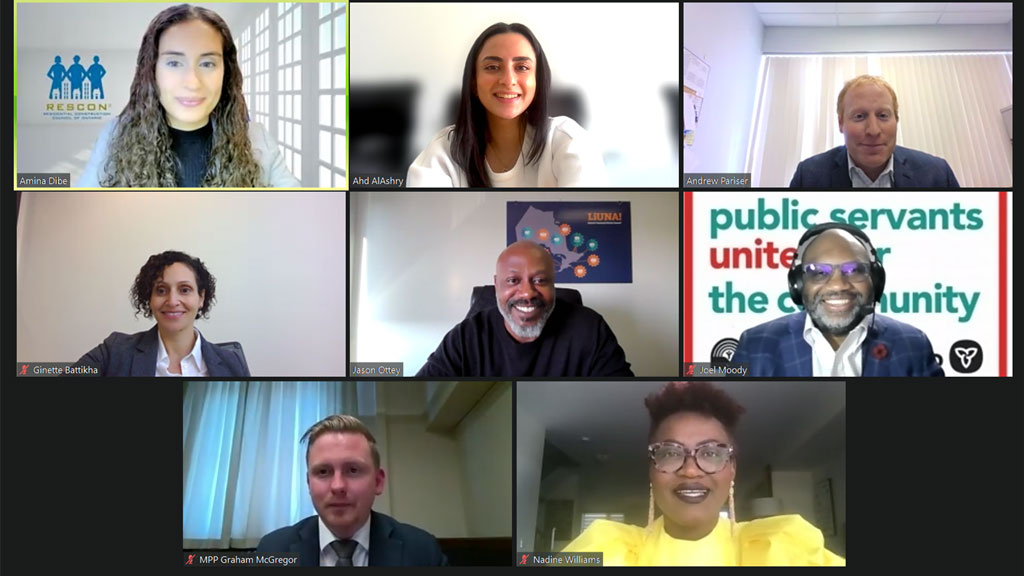When it comes to diversity, equity and inclusion efforts, is the construction industry losing momentum?
That was one of the concerns expressed by panellists during the Residential Construction Council of Ontario’s (RESCON) third annual Addressing Racism in Construction webinar.
“When the George Floyd incident occurred, when we had the nooses on construction sites, everybody stepped up and I was really proud of how the industry responded,” stated Jason Ottey, director of government relations and communications at LiUNA Local 183. “These groups and these sessions are critical in keeping that momentum up, but are we reverting back…to a time where this now is almost secondary? How do we keep these conversations happening? How do we continue to move the puck forward?
Ottey added, “Some of the areas I have been working on is trying to embed diversity, inclusion and sensitivity around these issues into what we do, not just in an organization but all the touchpoints that apprentices and journeypeople come into.”
Ginette Battikha, vice-president of people and culture at The Daniels Corporation, said keeping the issue front and centre has been a challenge for many companies.
“There is a small handful of people that are working tirelessly and they are getting tired,” she said. “It’s been working with other passionate people that keeps us going, sharing knowledge…looking for where there are wins.”
Chris Campbell, director of diversity, equity and inclusion with the Carpenters’ District Council of Ontario, said there are challenges when it comes to dealing with racism in the industry.
“Sometimes folks we need to step back a little bit and think about the idea of is it a cultural issue or a race issue, because like you and I know, there are bad apples out there,” he said. “Most people don’t get up and go to work with the intention of being racist or being a bad person. It takes time sometimes for individuals to adjust to working with people from other cultures and other groups.”
Campbell and Battikha agreed everyone has biases.
“A lot of times people will say, ‘I’m not biased’ because they associate bias with racism,” Battikha explained. “If you can’t get over that hump… (and say) ‘I have biases,’ then you are stuck there because then you are not able to acknowledge them and work on them.”
Ottey said the industry has a public perception problem.
“We need to understand how the public perceives this industry, because if it is negatively perceived our plans of attack might not actually be working. They might not actually be resonating with the people that we want to bring into this industry,” said Ottey. “One of the things I’ve been talking about is having a very exhaustive and seminal piece of research around public opinions focused on construction, but it doesn’t have to be, it can be the skilled trades more generally and how people perceive them in terms of quality of opportunity, diversity and inclusion.”
While it’s important to celebrate successes, it’s also important to talk about where the industry dropped the ball, he added.
He presented two examples of stories he continually hears in the industry. The first was about a young woman of colour who completed training and wanted to get into the trades.
“We reached out, she couldn’t get placed…we failed her,” he said. “We created, with that, one example a level of toxicity that will be spread amongst her friends, her community. That’s going to be hard to counter.”
The other example was employers who say their people don’t want to work with those from under-represented groups.
“I challenge them on that,” said Ottey. “I think we have to push back on this strongly. To suggest that you have no problem reprimanding your employees if they are late, if they are performing their work poorly, but on something like this all of the sudden they hold the cards, that’s unacceptable. We need to do more as an industry to support those people who are trying to get into this industry.”
There is no algorithm to end this process, he added.
“This is something that takes a lot of work, a lot of effort, a lot of conversations. We are never going to find a code that solves it. It takes time. We are going to have successes and we’re going to have failures, but we cannot keep our head in the sand. We’ve got to continue to look at all the options.”
Follow the author on Twitter @DCN_Angela




Recent Comments
comments for this post are closed